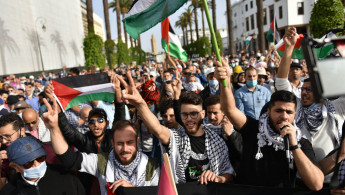Moroccans protest in solidarity with Palestinians despite state's normalisation agenda with Israel
Moroccans are set to mark the international day of solidarity with Palestinian people with several protests around the kingdom despite the state's cosy ties with the Israeli state.
On Monday, dozens of pro-Palestine activists, namely from the Moroccan front against normalisation, gathered at place Saraghna in Casablanca city.
Holding to keffiyehs and Palestinian flags, the crowd chanted "Palestine is a trust, normalisation is treason," for hours, calling on the Moroccan state to end its "shameful" ties with "the apartheid state."
Tens of similar protests are scheduled to occur across the kingdom's cities today, Tuesday, which coincides with the international day of solidarity with Palestine.
Since 1978, the date of 29 November was observed as the International Day of Solidarity with the Palestinian People.
This date, which was chosen because of its meaning and significance to the Palestinian people, is based on the call by the United Nations General Assembly for an annual observance of the resolution on the partition of Palestine.
Under the slogan, "struggle to dismantle the Zionist apartheid system," the Moroccan Front Against Normalisation also called on Moroccan teachers and schools to throw Palestinian-themed parties and events to face "the attempts targeting children to accept normalisation."
"Let's work together to keep the Palestinian cause present in the [new] generations' brains and hearts until the victory," said the Moroccan Front in a press release.
Since normalising ties late in 2020, Rabat and Tel Aviv have concluded several cooperation deals in military, trade and education.
In February 2021, Saaïd Amzazi, then Morocco's Minister of Education, had agreed with his Israeli counterpart Yoav Galant to "exchange student delegations and organise study trips in Israel and Morocco."
Several student exchanges occurred in the last months between the two states.
Most recently, five PhD Moroccan students arrived in July at the university Ben Gurion in the Negev. Meanwhile, several Israeli delegations of graduate students embarked on Ben Guerin's Mohammed VI Polytechnic University (UM6P) and Fes' Euro-Mediterranean University (UEMF).
In July, the Moroccan Observatory Against Normalisation With Israel, another Moroccan pro-Palestine group, flagged several "Israeli infiltrations and deceptions by the so-called scientific and research activities organised by officers and leaders in the Zionist army in a number of Moroccan campuses."
Morocco's ministry of education has not reacted to the observatory’s accusations yet.
Morocco is set to celebrate two years of normalisation with Israel on the 12th of December.
The emergence of official ties late in December 2020 was sealed following a US-brokered deal that saw Washington recognise Rabat's sovereignty over the Western Sahara region.
At the time, many Moroccans bitterly accepted the deal, including the pro-Palestine Justice and Development Party (PJD), viewing it as a patriotic duty that could help end the decades-long Western Sahara conflict in Morocco's favour.
However, Israel's recent mounting crimes against Palestinians have revived anti-normalisation sentiments in Morocco, David Govrin, the Head of the Israeli Liaison Office in Morocco, recently confessed.
In an interview with The Jerusalem Post, a day after Israel killed Palestinian journalist Shireen Abu Akleh, Govrin said such events "made the development of ties [between Morocco and Israel] more difficult".
"The Moroccan public deeply identifies with the Palestinians. It's a sensitive matter," he said.
PJD's leaders have also distanced themselves from the normalisation deal with its former leader and Morocco's former PM Saadeddine El-Othmani saying in a recent interview that he "was pressured to sign the deal from [a] higher authority".




 Follow the Middle East's top stories in English at The New Arab on Google News
Follow the Middle East's top stories in English at The New Arab on Google News
![A group of Palestinians, foreign and Israeli activists gather to participated in an olive picking event on the land in the town of Battir, which is under threat of confiscation by Israel in Bethlehem, occupied West Bank on 8 November 2024. [Getty]](/sites/default/files/styles/image_330x185/public/2182930803.jpeg?h=199d8c1f&itok=__0LgGsa)

![People gathered around the rubble of destroyed houses to search for survivors [Getty]](/sites/default/files/styles/image_330x185/public/2024-11/GettyImages-2184733820.jpg?h=199d8c1f&itok=NiM1LO2f)